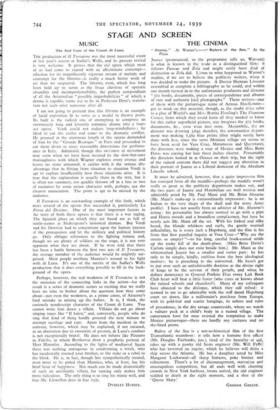STAGE AND SCREEN
MUSIC
The Sad Case of the Count di Luna THE production of 11 Trovatore was the most successful event of last year's season at Sadler's Wells, and its present revival is very welcome. It proves that the old opera which most of us had come to regard with an affectionate contempt— affection for its magnificently vigorous stream of melody and contempt for the libretto—is really a much better work of art than we suspected. The libretto, even, which has long been held up to scorn as the locus classicus of operatic absurdity and incomprehensibility, the perfect compendium of all the Aristotelian " possible improbabilities " of which a drama is capable, turns out to be in Professor Dent's transla- tion not such utter nonsense after all.
I am not going to pretend that this libretto is an example of lucid exposition fit to serve as a model to theatre poets.
Its fault is the radical one of attempting to compress an enormously long and leisurely romantic drama into a four- act opera. Verdi could not endure long-windedness ; he liked to cut the cackle and come to the dramatic conflict. He groaned at the enormous length of the operas demanded of him by the " Grande Boutique " in Paris and proceeded to cut them down to more reasonable dimensions for perform- ance in Italy. Admirable though this swianess of movement may seem when we have been wearied by the slow-but-sure thoroughness with which Wagner explores every avenue and leaves no stone unturned, it carries with it the serious dis- advantage that in flitting from situation to situation Verdi is apt to explain insufficiently how those situations arise. It is true that the explanation is usually there in the text, but it is often too summary, too quickly thrown off in a line or two of recitative by some minor character with, perhaps, not the clearest enunciation. The point is apt to be missed by the audience.
11 Trovatore is an outstanding example of this fault, which mars several of the operas that succeeded it, particularly La Forza del Destino. One of the most important factors in the story of both these operas is that there is a war raging. The Spanish plays on which they are based are as full of battle-scenes as Shakespeare's historical dramas. But Verdi and his librettist had to concentrate upon the human interest af the protagonists and let the military and political history go. Only oblique references to the fighting remain and, though we see plenty of soldiers on the stage, it is not very apparent what they are about. If he were told that there has been a battle between the first two acts of 1l Trovatore, the average member of the audience would be mightily sur- prised. Most people attribute Manrico's wound to his fight with di Luna. It's one of the merits of the Sadler's Wells production that it does everything possible to fill in the back- ground of the opera.
Perhaps, however, the real weakness of 11 Trovatore is not the omission of the connecting links in the action—for the result is a series of dramatic scenes so exciting that we really have no time to bother about the question how they come about—nor even the weakness, as a prime cause, of Azucena's fatal mistake in mixing up the babies. It is, I think, the curiously nondescript character of the Count di Luna. You cannot write him down a villain. Villains do not go about singing tunes like " Il balen," and, conversely, people who do sing that kind of thing hardly proceed the next minute to attempt sacrilege and rape. Apart from the incident in the convent, however, which may be explained, if not excused, as an aberration due to extremity of passion, di Luna's conduct is not exceptionally brutal. He does not behave like Pizzarro in Fidelio, in whom Beethoven drew a prophetic portrait of Herr Himmler. According to the lights of mediaeval Spain there was nothing outrageous in condemning a witch, who has incidentally roasted your brother, to the stake or a rebel to the block. He is, in fact, though less sympathetically treated, even more to be pitied than Manrico, who, at least, has his brief hour of happiness. Not much can be made dramatically of such an unvillainly villain, for ranting only makes him more ridiculous. The only thing is to sing his music well, and that Mr. Llewellyn does in fine style.
DYNELEY HUSSEY.




































 Previous page
Previous page